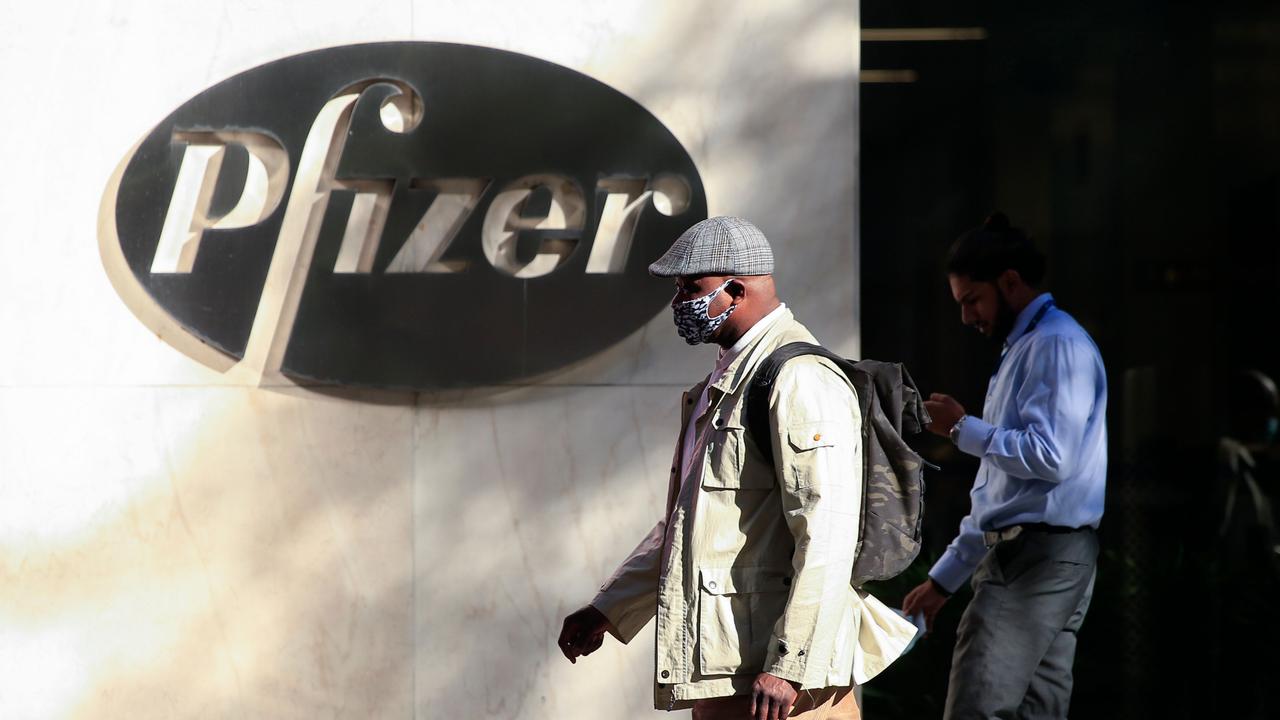Pfizer faces showdown with $1.5 billion activist investor after post-Covid share plunge
Pfizer is facing a showdown after a $1.5 billion bid to revive the company’s post-Covid share plunge took a “highly inappropriate, flagrantly unethical” twist.
Pfizer is facing a messy showdown this week after an outside bid to revive the company’s post-Covid share plunge took an alleged “highly inappropriate, flagrantly unethical” twist.
Starboard Value, a New York-based activist investor, took a stake of around $US1 billion ($1.5 billion) in Pfizer last week, The Wall Street Journal first reported, representing about 0.6 per cent of the $US165 billion ($245 billion) pharmaceutical giant.
The hedge fund, led by co-founder and chief executive Jeffrey Smith — once dubbed “the most feared man in corporate America” by Fortune magazine — is pushing for a strategy shift to turn around the struggling drugmaker.
But days ahead of a planned October 16 sit-down with Pfizer chief executive Albert Bourla and Shantanu Narayen, the company’s lead independent director, Starboard issued an extraordinary letter accusing Pfizer of intimidating two former executives into backing out of the activist push.
Former Pfizer CEO Ian Read — Dr Bourla’s predecessor who helmed the company for 10 years — and former chief financial officer Frank D’Amelio had both “expressed concerns about the trajectory of the business” during meetings with Starboard and “offered to be of assistance” as they “shared our desire to see Pfizer pursue a better path forward”, according to the letter.

Mr Read and Mr D’Amelio had reportedly spoken with several Pfizer board members about listening to Starboard’s pitch — but late on Wednesday night, the two men suddenly backed out.
“We have decided not to be involved in the efforts of Starboard Value regarding Pfizer,” they said in a joint statement. “We are fully supportive of Pfizer chairman and CEO Albert Bourla, senior management and the board, and we are confident that over time they will deliver shareholder value.”
In its Thursday letter, Starboard alleged that the men had been intimidated by Pfizer.
“Specifically, we understand that people within Pfizer and/or their representatives have contacted Mr Read and Mr D’Amelio and purportedly threatened to commence costly litigation against them, claw back prior compensation, and cancel unvested performance stock units, unless they publicly release a statement supporting the current chief executive officer, Dr Albert Bourla,” Mr Smith wrote.
“While we cannot be certain that the board did not authorise this behaviour, we sincerely hope that all, or at least some, members of the board were wholly unaware of this coercive conduct, which in our view constitutes a clear breach of fiduciary duty.”

Mr Smith requested that the Pfizer board “immediately establish a special committee of board members with clean hands to investigate the extent of this behaviour, determine who approved and executed such conduct, and promptly hold the responsible parties accountable”.
“To be clear, we believe this behaviour is highly inappropriate, flagrantly unethical, and a significant breach of fiduciary obligations,” he wrote.
“While we are deeply troubled by this unfortunate series of events, we do hope to have a constructive engagement with the company and look forward to meeting in-person this following Wednesday as scheduled.”
A spokeswoman for Pfizer declined to comment on Friday.
The drugmaker’s share price has roughly halved from a record high reached in late 2021 as the company raked in tens of billions of dollars in profits from its world-first Covid vaccine and antiviral pill.
Since then Pfizer, like fellow vaccine maker Moderna, has struggled to find a new product to make up for a revenue cliff, with weaker-than-expected uptake of its respiratory syncytial virus (RSV) vaccine and disappointing clinical results for its weight-loss pill.

Dr Bourla has been accused by some analysts of over-estimating future demand for Covid-related products once the health emergency subsided and making a series of irresponsible bets, particularly on cancer drugs, with Pfizer’s pile of pandemic cash.
The company has spent around $US70 billion ($104 billion) acquiring smaller biotech firms since 2020 including $US43 billion ($64 billion) on Seagen, $US6.7 billion ($9.9 billion) on Arena Pharmaceuticals, $US11.6 billion ($17.2 billion) on Biohaven and $US5.4 billion ($8 billion) on Global Blood Therapeutics.
Pfizer announced late last year it would cut $US3.5 billion ($5.2 billion) in costs by the end of 2024, and in May it revealed additional cost-cutting plans it said would save around $US1.5 billion ($2.2 billion) by 2027.
It’s not clear exactly how Starboard proposes to turn the company around. The Financial Times reported on Wednesday that Starboard had created an extensive slide deck on its plans but was yet to circulate it.
According to the newspaper, the proposed “shake-up plan” could include replacing Dr Bourla as CEO.
But Wall Street analysts warned there was no quick fix for Pfizer’s problems.
“We await future developments, but we do not see low-hanging fruit to boost shareholder value,” Leerink Partners analyst David Risinger wrote in a research note, Reuters reported on Sunday.
Starboard Value has been contacted for comment.






